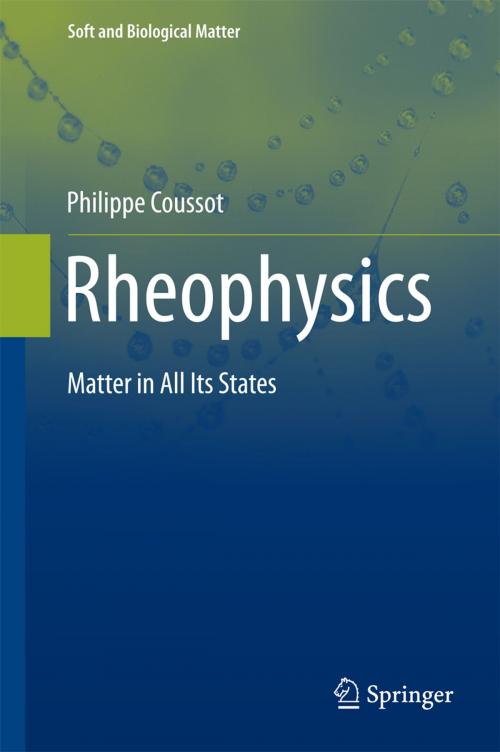Rheophysics
Matter in all its States
Nonfiction, Science & Nature, Science, Chemistry, Physical & Theoretical, Physics, Mechanics| Author: | Philippe Coussot | ISBN: | 9783319061481 |
| Publisher: | Springer International Publishing | Publication: | June 17, 2014 |
| Imprint: | Springer | Language: | English |
| Author: | Philippe Coussot |
| ISBN: | 9783319061481 |
| Publisher: | Springer International Publishing |
| Publication: | June 17, 2014 |
| Imprint: | Springer |
| Language: | English |
This book presents a unified view of the physicochemical origin of the mechanical behaviour of gases, simple solids and liquids, suspensions, polymers, emulsions, foams, and granular materials, along with techniques for measuring that behaviour. Besides molecular materials in all their classical gaseous, solid, or liquid states, we deal daily with a number of other materials made of coarser elements such as polymers, cells, grains, bubbles, and droplets. They take on the familiar appearance of paints, inks, cements, muds, foams, emulsions, toothpastes, gels, etc. These materials exhibit complex structures and sometimes amazing types of mechanical behaviour, often intermediate between those of a simple liquid and a simple solid. From a practical standpoint, the aim is to analyze their internal evolution (aging, restructuring, phase separation, etc.), then to formulate these materials in accordance with the desired properties, and thereby devise new materials. With that aim in mind, it is crucial to understand how these materials deform or flow, depending on the interactions and structures formed by the elements they contain. This book is intended for students as well as more advanced researchers in mechanics, physics, chemistry, and biology. The mathematical formalism is reduced in order to focus on physical explanations.
This book presents a unified view of the physicochemical origin of the mechanical behaviour of gases, simple solids and liquids, suspensions, polymers, emulsions, foams, and granular materials, along with techniques for measuring that behaviour. Besides molecular materials in all their classical gaseous, solid, or liquid states, we deal daily with a number of other materials made of coarser elements such as polymers, cells, grains, bubbles, and droplets. They take on the familiar appearance of paints, inks, cements, muds, foams, emulsions, toothpastes, gels, etc. These materials exhibit complex structures and sometimes amazing types of mechanical behaviour, often intermediate between those of a simple liquid and a simple solid. From a practical standpoint, the aim is to analyze their internal evolution (aging, restructuring, phase separation, etc.), then to formulate these materials in accordance with the desired properties, and thereby devise new materials. With that aim in mind, it is crucial to understand how these materials deform or flow, depending on the interactions and structures formed by the elements they contain. This book is intended for students as well as more advanced researchers in mechanics, physics, chemistry, and biology. The mathematical formalism is reduced in order to focus on physical explanations.















